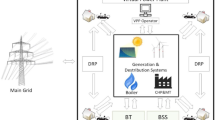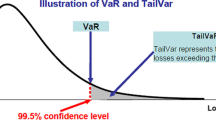Abstract
An energy hub has been lately introduced as a powerful model to optimize the cooperation among variety forms of energy. The energy hub provides output demands through converting, transmitting or storage process, feeding by various kinds of energy fuels as inputs of generating infrastructures. Input and output consist of different kinds of energy such as heat, power, gas, and hydrogen to promise the diversity of consumption side. In response to environmental concerns and increasing energy needs, the trend toward renewable distribution energy resources has been increased. In this chapter, the authors consider a renewable-based energy hub which contains wind turbine (WT), photovoltaic (PV) cells, energy storages, boiler, etc. Volatile nature of renewable energy resources makes new challenges to supply the demands. In this regard, an optimal stochastic short-term scheduling, considering the uncertainties of the renewable generations is presented. The stochastic formulation is led to design of optimal planning to increase not only total profit but also consumers’ satisfaction. A scenario-based technique is utilized to evaluate the uncertainties of the renewable sources. In order to decrease the number of sceneries, a proper scenario reduction method is applied on the problem. The influence of uncertainty factors such as solar irradiation and wind speed is investigated in the problem formulation. Moreover, in the scheduling model risk management problem is also considered. To confirm the effectiveness of the proposed method, it is applied on a proper test system.
Access this chapter
Tax calculation will be finalised at checkout
Purchases are for personal use only
Similar content being viewed by others
References
Geidl M, Koeppel G, Favre-Perrod P, Klockl B, Andersson G, Frohlich K (2007) Energy hubs for the future. IEEE Power Energy Mag 5(1):24–30
Hemmes K, Zachariah-Wolf J, Geidl M, Andersson G (2007) Towards multi-source multi-product energy systems. Int J Hydrogen Energy 32(10):1332–1338
Parisio A, Del Vecchio C, Vaccaro A (2012) A robust optimization approach to energy hub management. Int J Electr Power Energy Syst 42(1):98–104
Maroufmashat A, Elkamel A, Fowler M, Sattari S, Roshandel R, Hajimiragha A, Walker S, Entchev E (2015) Modeling and optimization of a network of energy hubs to improve economic and emission considerations. Energy 93:2546–2558
La Scala M, Vaccaro A, Zobaa A (2014) A goal programming methodology for multiobjective optimization of distributed energy hubs operation. Appl Therm Eng 71(2):658–666
Majidi M, Nojavan S, Zare K (2017) A cost-emission framework for hub energy system under demand response program. Energy 134: 157–166
Roldán-Blay C, Escrivá-Escrivá G, Roldán-Porta C, Álvarez-Bel C (2017) An optimisation algorithm for distributed energy resources management in micro-scale energy hubs. Energy 132:126–135
Rastegar M, Fotuhi-Firuzabad M, Lehtonen M (2015) Home load management in a residential energy hub. Electr Power Syst Res 119:322–328
Sheikhi A, Rayati M, Bahrami S, Ranjbar AM, Sattari S (2015) A cloud computing framework on demand side management game in smart energy hubs. Int J Electr Power Energy Syst 64:1007–1016
Sheikhi A, Bahrami S, Ranjbar AM (2015) An autonomous demand response program for electricity and natural gas networks in smart energy hubs. Energy 89:490–499
Vahid-Pakdel M, Nojavan S, Mohammadi-ivatloo B, Zare K (2017) Stochastic optimization of energy hub operation with consideration of thermal energy market and demand response. Energy Convers Manag 145:117–128
Moghaddam IG, Saniei M, Mashhour E (2016) A comprehensive model for self-scheduling an energy hub to supply cooling, heating and electrical demands of a building. Energy 94:157–170
Shariatkhah M-H, Haghifam M-R, Parsa-Moghaddam M, Siano P (2015) Modeling the reliability of multi-carrier energy systems considering dynamic behavior of thermal loads. Energy Build 103:375–383
Orehounig K, Evins R, Dorer V (2015) Integration of decentralized energy systems in neighbourhoods using the energy hub approach. Appl Energy 154:277–289
Salimi M, Ghasemi H, Adelpour M, Vaez-ZAdeh S (2015) Optimal planning of energy hubs in interconnected energy systems: a case study for natural gas and electricity. IET Gener Transm Distrib 9(8):695–707
Dolatabadi A, Mohammadi-ivatloo B, Abapour M, Tohidi S (2017) Optimal stochastic design of wind integrated energy hub. IEEE Trans Ind Inf 99:1
Moeini-Aghtaie M, Dehghanian P, Fotuhi-Firuzabad M, Abbaspour A (2014) Multiagent genetic algorithm: an online probabilistic view on economic dispatch of energy hubs constrained by wind availability. IEEE Trans Sustain Energy 5(2):699–708
Bozchalui MC, Hashmi SA, Hassen H, Cañizares CA, Bhattacharya K (2012) Optimal operation of residential energy hubs in smart grids. IEEE Trans Smart Grid 3(4):1755–1766
Shahmohammadi A, Moradi-Dalvand M, Ghasemi H, Ghazizadeh M (2015) Optimal design of multicarrier energy systems considering reliability constraints. IEEE Trans Power Deliv 30(2):878–886
Moeini-Aghtaie M, Farzin H, Fotuhi-Firuzabad M, Amrollahi R (2017) Generalized analytical approach to assess reliability of renewable-based energy hubs. IEEE Trans Power Syst 32(1):368–377
Sharif A, Almansoori A, Fowler M, Elkamel A, Alrafea K (2014) Design of an energy hub based on natural gas and renewable energy sources. Int J Energy Res 38(3):363–373
Conejo AJ, Carrión M, Morales JM (2010) Decision making under uncertainty in electricity markets, vol 153. Springer Science & Business Media, New York
Hosseini-Firouz M (2013) Optimal offering strategy considering the risk management for wind power producers in electricity market. Int J Electr Power Energy Syst 49:359–368
Alipour M, Mohammadi-Ivatloo B, Zare K (2015) Stochastic scheduling of renewable and CHP-based microgrids. IEEE Trans Ind Inf 11(5):1049–1058
Abbaspour M, Satkin M, Mohammadi-Ivatloo B, Lotfi FH, Noorollahi Y (2013) Optimal operation scheduling of wind power integrated with compressed air energy storage (CAES). Renew Energy 51:53–59
Ji W, Chee KC (2011) Prediction of hourly solar radiation using a novel hybrid model of ARMA and TDNN. Sol Energy 85(5):808–817
Dolatabadi A, Mohammadi-Ivatloo B (2017) Stochastic risk-constrained scheduling of smart energy hub in the presence of wind power and demand response. Appl Therm Eng 123:40–49
The GAMS software website (2012)
Brooke A, David K, Meeraus A (1996) GAMS release 2.25; a user’s guide. GAMS Development Corporation, Washington, DC (EUA)
Alipour M, Zare K, Abapour M (2017) MINLP probabilistic scheduling model for demand response programs integrated energy hubs. IEEE Trans Ind Inf. https://doi.org/10.1109/TII. 2017.2730440
Honarmand M, Zakariazadeh A, Jadid S (2014) Integrated scheduling of renewable generation and electric vehicles parking lot in a smart microgrid. Energy Convers Manag 86:745–755
Soroudi A, Keane A (2015) Risk averse energy hub management considering plug-in electric vehicles using information gap decision theory. In: Plug in electric vehicles in smart grids. Springer, Singapore, pp 107–127
Author information
Authors and Affiliations
Corresponding author
Editor information
Editors and Affiliations
Nomenclature
Nomenclature
10.1.1 Indices
- ω :
-
Scenario index [1 : N ω ]
- e :
-
Index of electrical storage unit
- h :
-
Index of thermal storage unit
- s :
-
Index of energy storage units
- t :
-
Time index [1 : N t ]
10.1.2 Parameters
- α :
-
Confidence level
- \( {\eta}_h^B \) :
-
The efficiency of boiler unit
- \( {\eta}_e^{\mathrm{CHP}}/{\eta}_h^{\mathrm{CHP}} \) :
-
The efficiency of electrical/thermal generation of CHP unit
- η PV :
-
The efficiency of PV panel
- \( {\lambda}_t^e/{\lambda}_t^g \) :
-
Electricity/gas price of the grid at tth hour
- \( {E}_{\mathrm{min}}^s/{E}_{\mathrm{max}}^s \) :
-
Minimum/maximum stored energy of storage unit
- \( {H}_{\mathrm{min}}^{\mathrm{CHP}}/{H}_{\mathrm{max}}^{\mathrm{CHP}} \) :
-
Minimum/maximum heat production of CHP unit
- \( {H}_{\mathrm{min}}^B/{H}_{\mathrm{max}}^B \) :
-
Minimum/maximum heat production of boiler unit
- \( {P}_{\mathrm{max}}^{\mathrm{WT}} \) :
-
Maximum output power of WT
- \( {P}_{\mathrm{min}}^{\mathrm{CHP}}/{P}_{\mathrm{max}}^{\mathrm{CHP}} \) :
-
Minimum/maximum electrical power production of CHP unit
- \( {P}_t^{\mathrm{electrical}}/{P}_t^{\mathrm{thermal}} \) :
-
Electrical/thermal demand of REH
- R U/R D :
-
Ramp-up/down power CHP unit
- S R :
-
The value of rated wind speed
- S CI/S CO :
-
The value of cut-in/cut-out wind speed
10.1.3 Variables
- ξ ω :
-
Auxiliary variable used for CVaR computing
- \( {\upsilon}_t^{\mathrm{CHP}} \) :
-
Binary variable depicted on/off state of CHP unit
- π ω :
-
Probability of ωth scenario
- \( {E}_t^s \) :
-
Amount of stored energy in energy storage at tth hour and ωth scenario
- \( {E}_{t,\omega}^{s,\mathrm{ch}}/{E}_{t,\omega}^{s,\mathrm{dis}} \) :
-
Charging/discharging of energy storage
- \( {H}_{\omega, t}^B \) :
-
Thermal generation of boiler unit at tth hour and ωth scenario
- \( {H}_{\omega, t}^{\mathrm{CHP}} \) :
-
Thermal generation of CHP unit at tth hour and ωth scenario
- \( {I}_{\omega, t}^{\mathrm{PV}} \) :
-
Solar radiation
- \( {P}_{\omega, t}^{\mathrm{PV}} \) :
-
Utilizing solar power
- \( {P}_{\omega, t}^{\mathrm{WT}} \) :
-
Utilizing wind power
- \( {P}_{\omega, t}^{\mathrm{CHP}} \) :
-
Power generation of CHP unit at tth hour and ωth scenario
- \( {P}_{\omega, t}^{A,\mathrm{WT}} \) :
-
Available wind power at tth hour and ωth scenario
- \( {P}_{\omega, t}^{g,\mathrm{grid}}/{P}_{\omega, t}^{e,\mathrm{grid}} \) :
-
Purchased gas/power from the grid at tth hour and ωth scenario
- S ω, t :
-
Wind speed at tth hour and ωth scenario
- \( {T}_t^{\mathrm{Out}} \) :
-
Environment temperature
- \( {u}_{\mathrm{SU},t}^{\mathrm{CHP}}/{u}_{\mathrm{SD},t}^{\mathrm{CHP}} \) :
-
Binary variable depicting start-up/shutdown status of CHP unit at tth hour
- VaR:
-
Value-at-risk (VaR)
Rights and permissions
Copyright information
© 2018 Springer International Publishing AG, part of Springer Nature
About this chapter
Cite this chapter
Aliasghari, P., Alipour, M., Jalali, M., Mohammadi-Ivatloo, B., Zare, K. (2018). Risk-Constraint Scheduling of Storage and Renewable Energy Integrated Energy Hubs. In: Mohammadi-Ivatloo, B., Jabari, F. (eds) Operation, Planning, and Analysis of Energy Storage Systems in Smart Energy Hubs. Springer, Cham. https://doi.org/10.1007/978-3-319-75097-2_10
Download citation
DOI: https://doi.org/10.1007/978-3-319-75097-2_10
Published:
Publisher Name: Springer, Cham
Print ISBN: 978-3-319-75096-5
Online ISBN: 978-3-319-75097-2
eBook Packages: EnergyEnergy (R0)




